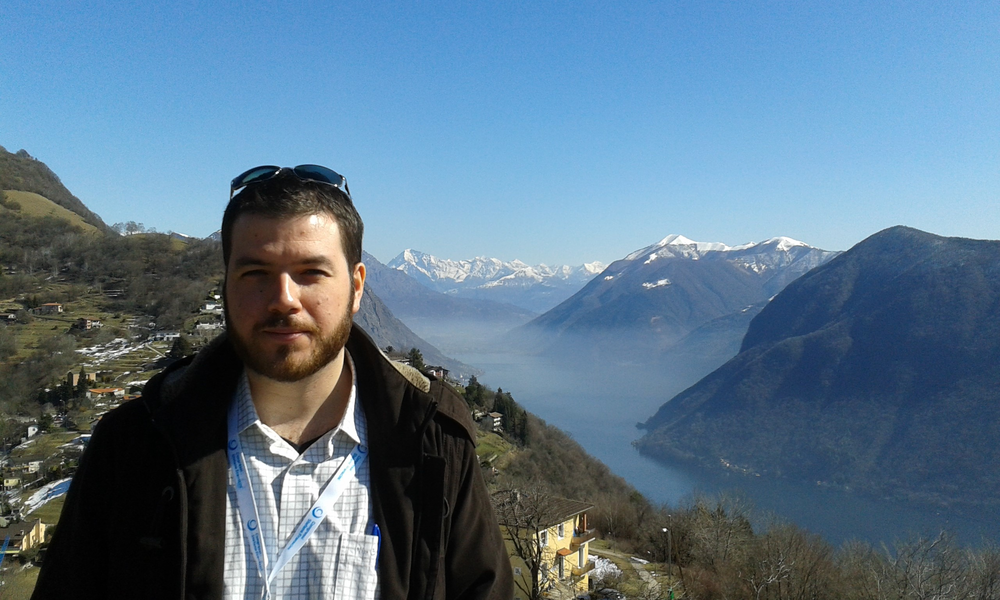NanoFASE Scientist Andreas Gondikas designated 2017 Rising Star of Environmental Nanosciences
Andreas' speech from the ICEEN award ceremony (Sept. 2017) shares his perspective on the field and acknowledges guiding lights
It is a great honor to receive this award in memory of Professor Steve Klaine, and to be asked to share some thoughts about the field of environmental nanosciences.
The motivation behind my 10-year scientific career in environmental nanosciences is taking part in a proactive effort to determine the potential environmental effects of a technology with a wide range of applications that could drastically change our lives.
There are so many examples in history when this type of effort started after it was already too late. For example, numerous people had to suffer from lung cancer and smoking-related health issues before scientists started examining the adverse effects of smoking. Furthermore, there are many beaches in the world where sand has been completely covered with small plastic pieces and it is only after the fact that global-scale efforts began to study the spread and impact of plastics in the environment.
I therefore feel lucky to be part of a proactive effort aiming to determine the potential impact of a new technology. However, a major challenge in this effort is that the problem is not currently there and scientists have to predict what may become an issue in the future. Their success is largely dependent on their background, limitations in analytical equipment, and their imagination. I remember struggling with the notion of studying the environmental behavior and fate of materials, such as silver nanoparticles, that are unlikely to be released in high enough amounts to pose a significant environmental risk; or studying materials, such as rutile titanium dioxide nanoparticles, that are already abundant in nature and where the anthropogenic input may be lower than natural levels.
What helps me overcome these conceptual hurdles is that environmental nanosciences have taken up the challenge to build the tools that will allow timely risk assessment of an enormous variety of new materials that I believe will enter our everyday lives in the near future. That difficult task requires deep understanding of the dynamic nature of nanomaterials and pushing the limits of analytical equipment. That cause gives me inspiration and the drive to continue being part of this international and multidisciplinary effort.

I wish to acknowledge the people whose scientific wisdom and character have been a source of inspiration for me. I studied chemical engineering at the National Technical University of Athens, while conducting the experimental work of my thesis at the GSF research center in Munich with Prof. Maria Ochsenkuhn-Petropoulou and Prof. Bernhard Michalke. I was first introduced and educated in the field of environmental nanosciences during my PhD studies at Duke University under the supervision of Prof. Heileen Hsu-Kim and benefitted from collaborations within CEINT, with leaders in the field Prof. Mark Wiesnerα and Prof. Greg Lowryα as well as Dr. Melanie Auffan, Dr. Armand Masion, Prof. Boris Lau and many others. During that time I had the opportunity to study the transformation mechanisms of nanomaterials, while learning and operating state-of-the-art analytical equipment and utilizing several synchrotron facilities in the US and France. I then joined the group of Dr. Frank von der Kammer* and Prof. Thilo Hofmann at the University of Vienna, where I was introduced to new and cutting-edge analytical equipment. I was extremely fortunate to collaborate with distinguished scientists such as Dr. Ralf Kaegi* and Dr. Olga Borovinskaya, and work alongside excellent fellow researchers such as Dr. Robert Reed, Dr. Antonia Praetorius*, Dr. Jana Navratilova, Dr. Adam Laycock, and many others. I am now working with Prof. Martin Hassellöv*, at the University of Gothenburg, who has introduced me to the marine ecosystem and I am specializing in electron microscopy based methods of analysis, in a team with brilliant researchers Therese Karlsson and Dr. Karin Mattsson.
αNanoFASE International Advisory Board members *NanoFASE research colleagues
Dr. Andreas Gondikas is part of NanoFASE WP8: Environmental Behavior of ENM in Waters and Sediments. His personal profile is online in our updated Young NanoScientists gallery.
Rising Star award in memory of Professor Steve Klaine
As one of the founding fathers of environmental nanosciences, and the ICEENN conference series, Professor Stephen J. Klaine is sadly missed by all following his untimely death in 2016. To honour Steve’s commitment to education and training of young scientists, an award was created to single out a postdoctoral fellow. The 'Rising Star of Environmental Nanosciences' award was granted to NanoFASE collaborator Dr. Andreas Gondikas during the 12th International Conference on the Environmental Effects of Nanoparticles and Nanomaterials (ICEENN 2017, Birmingham, UK).
Below Andreas receives the 2017 award certificate from Prof. Richard Handy, University of Plymouth.
